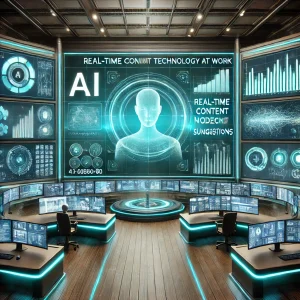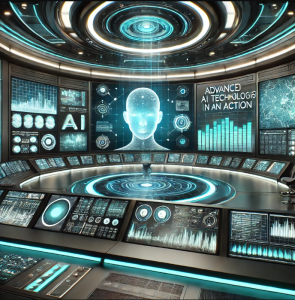The Role of AI in Audio Mastering
Audio mastering is the final step in the music production process, a critical phase where a track is polished, optimized, and prepared for distribution. Mastering involves a series of fine-tuning processes aimed at ensuring the audio sounds its best on various playback systems, from headphones to large speakers. It’s an art that balances technical skills with a deep understanding of how sound interacts with human perception. Traditional mastering requires a trained ear to adjust levels, equalization, and dynamics, ensuring consistency and clarity across an album or soundtrack. This meticulous process not only enhances the overall listening experience but also ensures that the audio meets industry standards. In recent years, Artificial Intelligence (AI) has begun to play a significant role in audio engineering, particularly in the realm of mastering. AI in audio mastering marks a paradigm shift from traditional techniques, introducing automated processes that can analyze and adjust audio tracks with remarkable precision. These AI-driven tools use sophisticated algorithms to replicate the decision-making process of a human mastering engineer. They can identify specific aspects of a track that need adjustment, such as volume leveling, frequency balancing, and stereo enhancement. The emergence of AI in this field is not just a technological advancement; it’s a revolution that is making high-quality mastering more accessible and efficient, while also opening up new possibilities in the way audio is produced and experienced.
How AI is Changing Audio Mastering
AI Algorithms in Enhancing Sound Quality
AI algorithms are significantly enhancing the sound quality in audio mastering, bringing a level of precision and detail that was challenging to achieve manually. These algorithms analyze the audio track’s spectral content, dynamics, and other key elements, making adjustments to ensure optimal sound quality across different playback systems. AI can detect and correct issues such as imbalances in EQ, over-compression, and inconsistencies between tracks. This technology is particularly adept at handling complex audio scenes, where numerous elements must be balanced harmoniously. By leveraging AI, the mastered tracks achieve a level of polish and clarity that meets professional standards, often in a fraction of the time it would take through traditional methods.
Automation of Mastering Processes
One of the most significant impacts of AI in audio mastering is the automation of various mastering processes. AI-powered mastering tools can perform tasks like volume normalization, stereo widening, and harmonic saturation automatically. This automation streamlines the mastering workflow, allowing for quicker turnaround times without compromising the quality of the audio. For music producers and audio engineers, this means they can focus more on the creative aspects of production while leaving the technical intricacies of mastering to AI. The automation also democratizes audio mastering, making it more accessible to independent artists and smaller studios who may not have the resources for traditional mastering services.
Personalization and AI’s Adaptive Techniques
AI in audio mastering also brings a level of personalization and adaptability that was previously unattainable. AI tools can adapt to the specific style or genre of the music, applying mastering techniques that are most suitable for that particular sound. This adaptability ensures that each track is treated in a way that enhances its unique characteristics. Furthermore, some AI mastering platforms offer customizable settings, allowing users to input their preferences or desired sound profiles. This level of personalization ensures that the final master aligns with the artist’s vision, providing a tailored listening experience that resonates with both the creator and the audience.
Advantages of AI in Mastering
1. Increased Efficiency and Consistency
One of the foremost advantages of using AI in audio mastering is the significant increase in efficiency and consistency it brings to the process. AI algorithms work at a speed unmatched by human capabilities, processing and mastering tracks in a fraction of the time traditionally required. This rapid turnaround is particularly beneficial in today’s fast-paced music industry, where time-to-market can be crucial. Additionally, AI provides a level of consistency that is hard to achieve manually. By applying the same set of standards and parameters across multiple tracks, AI ensures a uniform sound quality and character throughout an album or playlist, maintaining a cohesive audio experience for the listener.
2. Accessible Mastering Solutions for Independent Artists
AI-driven mastering solutions are democratizing the audio production process, making high-quality mastering accessible to independent artists and smaller studios. Traditionally, professional mastering has been a costly process, often requiring the hiring of specialized engineers. AI mastering tools, on the other hand, are more affordable and accessible, requiring less specialized knowledge to use effectively. This accessibility allows independent artists to achieve a polished, professional sound without the need for significant investment, leveling the playing field in the music industry and encouraging a diversity of voices and styles.
3. Precision and Accuracy in Sound Optimization
AI also excels in providing precision and accuracy in sound optimization, a critical aspect of audio mastering. Through detailed analysis of audio elements, AI algorithms can make precise adjustments to enhance the overall sound quality. This includes fine-tuning frequencies, adjusting dynamics, and correcting sonic imbalances, ensuring that the final track sounds clear and balanced on a wide range of playback systems. The precision of AI in identifying and correcting minute audio details surpasses what is typically achievable through manual processes, leading to a superior listening experience. This accuracy not only elevates the quality of the audio but also reflects the artistic intentions more faithfully, ensuring that the listener enjoys the music as the artist intended.
Case Studies: AI in Professional Mastering
AI Mastering in Music Production
In the realm of music production, AI mastering has made notable strides, as evidenced by several success stories. An independent artist who utilized an AI mastering service for their debut album, achieving a sound quality comparable to big-label productions. Another example is a record label that adopted AI mastering across its catalogue, significantly reducing production times while maintaining high audio quality. These case studies demonstrate how AI mastering can provide both cost-effective and high-quality solutions, making professional-level sound accessible to artists at all levels.
AI Applications in Film and Broadcast
AI has also made its mark in the film and broadcast industry, where sound quality is paramount. A post-production studio that incorporated AI into its workflow, streamlining the mastering process for a series of documentaries. This integration allowed for consistent audio quality across episodes, despite varying recording conditions. Another example is a broadcasting company using AI to master live feeds, ensuring clear and balanced audio for viewers in real-time. These instances highlight AI’s versatility and effectiveness in diverse audio production environments.
Innovations in Live Sound Mastering
Live sound mastering is another area where AI is making significant advancements. A notable exampleis a concert where AI is used to master the live audio feed, adapting in real-time to changes in the environment and performance dynamics. This application of AI not only enhanced the audience’s listening experience but also reduced the workload on the sound engineering team. Such innovations in live sound mastering illustrate AI’s potential to handle complex, dynamic audio scenarios, providing both efficiency and quality enhancements in real-time sound production.
Balancing AI and Human Expertise
The Role of Human Creativity in Mastering
While AI significantly enhances the technical aspects of audio mastering, the role of human creativity and expertise remains irreplaceable. Mastering is not just about technical precision; it’s an art form that involves subjective decisions based on emotion, style, and creative intent. Human mastering engineers bring years of experience and a nuanced understanding of different musical genres, something that AI is yet to fully replicate. They can interpret the artist’s vision and add a unique touch to the final sound that resonates with human emotions. The challenge lies in finding the right balance where AI complements human creativity, enhancing the technical quality of the sound while preserving the artistic essence that only a human touch can provide.
Collaborative Approaches between AI and Sound Engineers
A collaborative approach, where AI and sound engineers work in tandem, is key to maximizing the benefits of technology in audio mastering. AI can handle routine tasks and initial sound adjustments, allowing engineers to focus on more intricate and creative aspects of mastering. For instance, AI can provide a starting point for mastering, which engineers can then refine and adjust based on their expertise and creative judgment. This partnership can lead to a more efficient workflow and potentially superior final products, leveraging the strengths of both AI and human expertise.
Ethical Considerations in Automated Mastering
The rise of AI in audio mastering also brings forth ethical considerations, particularly concerning the transparency and originality of AI-assisted work. It’s important to maintain transparency about the extent of AI’s involvement in the mastering process, especially when it comes to commercial releases. There’s also a need to address concerns about the potential homogenization of music, as AI tools might standardize sound to certain presets or popular styles. Upholding ethical practices in automated mastering involves ensuring diversity and originality in sound, while also acknowledging and crediting the contribution of AI where appropriate. As AI continues to evolve in the field of audio mastering, navigating these ethical considerations will be crucial for maintaining the integrity and diversity of musical expression.
Preparing for an AI-Driven Future in Audio Mastering
Keeping Up with Technological Advances
As the landscape of audio mastering evolves with the integration of AI, staying current with technological advances is crucial. For professionals in the industry, this means continuously monitoring the development of new AI tools and mastering techniques. Subscribing to industry publications, attending professional workshops, and participating in online forums can keep you informed about the latest AI advancements. Additionally, exploring and experimenting with emerging AI software and tools will provide hands-on experience and a deeper understanding of how these technologies can be integrated into traditional mastering workflows.
Skills Development for Audio Professionals
The rise of AI in audio mastering necessitates a shift in the skill set required for audio professionals. In addition to traditional audio engineering skills, there’s a growing need to understand the fundamentals of AI and how it applies to sound. Training in the use of AI tools, understanding machine learning basics, and developing skills in digital audio software that incorporates AI are becoming increasingly important. Audio professionals should consider engaging in continuous learning opportunities, such as online courses or certification programs, to acquire these new competencies. This proactive approach to skills development will not only enhance their mastery of the craft but also ensure their relevance in a rapidly changing industry.
The Evolving Landscape of Audio Technology
As we look towards the future, the landscape of audio technology is set to evolve even further with the advancement of AI. This evolution will likely bring more sophisticated AI algorithms capable of making more nuanced decisions in mastering, possibly even mimicking the artistic choices of human engineers. There’s also the potential for AI to open new avenues in audio production, such as creating entirely new sounds or assisting in interactive audio experiences like podcasts or virtual reality. Preparing for this future involves not only adapting to new technologies as they emerge but also anticipating the ways in which these advancements can transform the audio industry. Embracing this evolving landscape with an open and innovative mindset will be key for audio professionals to thrive in an AI-driven future.
Read 7 Best AI Audio Tools in 2024
The Role of AI in Audio Mastering: Conclusion
Recap of AI’s Impact on Audio Mastering
Throughout this discussion on “The Future of Sound: AI’s Transformational Role in Audio Mastering,” we’ve explored the significant impact of AI in the realm of sound engineering. AI has revolutionized the process of audio mastering by introducing unparalleled efficiency, precision, and accessibility. From enhancing sound quality to automating and personalizing the mastering process, AI’s contributions have been transformative. We’ve seen how AI complements human expertise, leading to innovative approaches in music production, film, and broadcast sound. The technology has not only streamlined workflows but also opened new creative possibilities, making professional mastering more accessible to a wider range of artists and producers.
The Future Potential of AI in Sound Engineering
Looking ahead, the potential of AI in sound engineering is boundless. As AI technology continues to evolve, we can anticipate even more advanced applications in audio mastering. This could include more nuanced and sophisticated AI algorithms capable of making creative decisions, further blurring the line between technology and artistry. The future may also see AI playing a significant role in emerging audio formats and interactive experiences, continually pushing the boundaries of what is possible in audio production. The ongoing development of AI in this field promises not only technical advancement but also an expansion of creative horizons for audio professionals and enthusiasts alike.
Embracing AI for Enhanced Audio Experiences
In conclusion, embracing AI in audio mastering is not just about adapting to a new technological tool; it’s about recognizing and leveraging a powerful ally in the pursuit of sonic excellence. For audio professionals, staying abreast of AI advancements and integrating these tools into their workflow is essential for staying competitive in a rapidly evolving industry. For artists and creators, utilizing AI in audio mastering offers an opportunity to elevate the quality of their work, ensuring that their audio sounds its best in any setting. As we move forward, the synergy between AI and human creativity will undoubtedly lead to more enriched and immersive audio experiences, marking a new era in the world of sound engineering.
Embrace the Sonic Revolution: AI in Audio Mastering
Opportunities for Artists and Engineers in AI Mastering
The advent of AI in audio mastering presents a world of opportunities for both artists and sound engineers. Embrace this technological evolution by exploring how AI can enhance your work. For artists, AI mastering offers the chance to achieve professional sound quality without prohibitive costs. For engineers, it’s an opportunity to refine your craft, incorporating AI tools to handle routine tasks and focus on creative aspects of sound production. Dive into this new era where technology meets artistry, and discover how you can produce superior sound, innovate in your techniques, and stay ahead in the competitive field of audio production.
Exploring AI Tools and Resources
Now is the time to actively explore the AI tools and resources available in the market. Start by experimenting with different AI mastering platforms to understand their capabilities and how they can benefit your specific needs. Utilize online tutorials, webinars, and forums to deepen your understanding of AI in audio mastering. Consider attending workshops or enrolling in courses that focus on the intersection of AI and sound engineering. By actively engaging with these resources, you can not only enhance your technical skills but also gain a competitive edge in an industry that’s rapidly embracing AI.
Fostering Innovation in Audio Production
Fostering innovation in audio production involves staying open-minded and adaptive to new technologies. Encourage experimentation with AI in your projects and collaborations. Share your experiences and insights with the community to inspire others and drive collective growth in the field. Embrace the possibilities that AI brings, pushing the boundaries of traditional audio production to create groundbreaking sound experiences. By adopting a mindset that welcomes innovation, you contribute to shaping a future in audio mastering that is defined by creativity, efficiency, and unparalleled sound quality.




